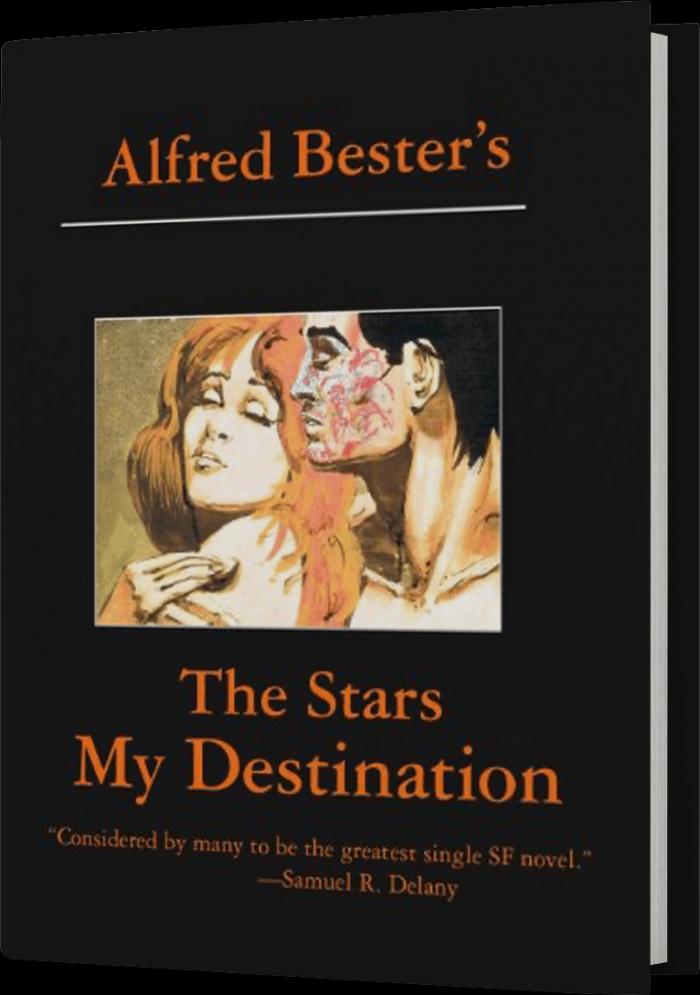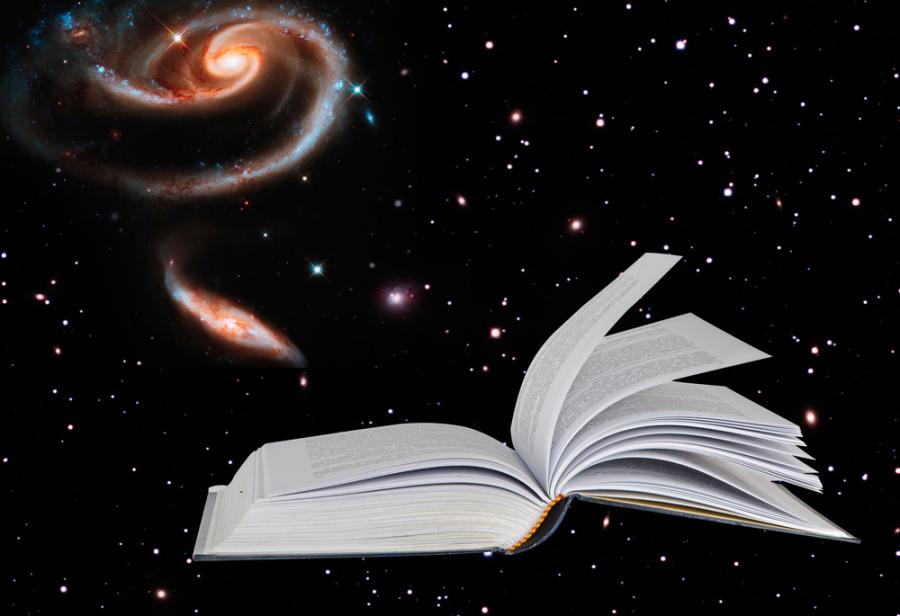
What a time to be reading science fiction! As our toy collections begin to resemble those of a Star Trek character, a stroll through the science fiction section of the library or bookstore (activities that science has almost rendered obsolete) is a walk back in time as much as it is a walk into the future.
The best sci-fi books function as a captivating exercise in world-building, creating immersive far-flung landscapes for us to get lost in, with fascinating characters to guide us.
At their best, sci fi books shine a light on the big questions of the present by extrapolating human trends to their logical endpoint. They also express the authors’ hopes and fears for the future. Other good sci-fi books illuminate the mindset of the era in which they were written. Above all, classic sci-fi books eerily presage the world we live in now or a plausible future and all its ramifications.
Here are our picks for the 22 best sci-fi books of all time.
1- To Your Scattered Bodies Go by Philip Jose Farmer
Amazon
To Your Scattered Bodies Go (Riverworld Saga, Book 1)
Features
| Part Number | 9780345419675 |
| Release Date | 1998-06-30T00:00:01Z |
| Edition | Reprint |
| Language | English |
| Number Of Pages | 224 |
| Publication Date | 1998-06-30T00:00:01Z |
Farmer’s far-out “Riverworld” series starts with a mystery wrapped in a riddle. Famous explorer Richard Francis Burton’s death on Earth is only the beginning—he awakens half-formed in what seems to be an alien lab. Soon he is coming to, naked and hairless, emerging from a river in a strange world. He’s not alone—the visitors who arrived here via the river span eons of humankind. They include a Neaderthal, a sci-fi writer, and the girl who inspired Alice In Wonderland.
The group embark on a quest to discover what happened to them, as well as the nature of the world where they seem to have emerged after their deaths. On the way, they come into contact with foes like Roman king Tullus Hostilus and Nazi commander Hermann Goering, as their adventure brings them closer and closer to deep, dark truths about the origins of the human race.
2- The Martian by Andy Weir
Amazon
Features
| Part Number | unknown |
| Edition | Young Readers |
| Language | English |
| Publication Date | 1819T |
The success of The Martian is a science fiction story in and of itself, not least by the standards of the publishing industry. Rejected by every publisher, first-time novelist Weir, the child of scientists and a CS major, decided to self-publish the book one chapter at a time on his blog. The serial release became such a sensation that he released a Kindle edition on Amazon to respond to popular demand. Publishers came crawling back, leading to a debut on the New York Times bestseller list and an Academy Award-nominated blockbuster film adaptation.
Reading the book, it’s easy to see why it earned its reputation as one of the best sci-fi books of the decade. Built around a deeply plausible scenario for the near future, the straightforward prose immerses you in the mind of Mark Watney, an astronaut accidentally marooned on Mars when his shipmates have to abort their mission and leave him for dead. The most important supporting character is science itself, as we follow Watney on an epic journey to escape Mars alive, with nothing but his wits and the laws of thermodynamics as weapons. Back on Earth, NASA engineers, as well as his crewmates on their return journey, make sacrifices and manipulate physics to right the wrong of leaving Watney behind.
Unlike many classic sci-fi books, which adopt a gloomy outlook on humankind, The Martian is a rousingly positive affirmation of the transformative power of science and the human spirit.
3- The Stars My Destination by Alfred Bester
Amazon
Features
- Used Book in Good Condition
Part revenge story, part cautionary tale, part messianic vision, and one of the all-around best sci-fi books, The Stars My Destination envisions a world where humans can teleport, or “jaunt,” anywhere in the solar system. Far from ushering in an era of peace and cooperation, jaunting leads to war between inner planet and outer solar system factions. Into this fray sails Foyle, a spacefaring tattooed ne’er-do-well who gets marooned in his spaceship far from anything and embarks on a seething quest for revenge against those who abandoned him.
His journey across the solar system leads him across the path of various cults, amplifying strange visions of his own fiery fate and ultimately leading him to the astonishing discovery of the secret of interstellar jaunting … a skill that will change everything for him and for the solar system.
4- The War of the Worlds by H.G. Wells
Amazon
Features
| Part Number | NUSBK20160901-C142548 |
| Release Date | 2002-05-28T00:00:01Z |
| Edition | Reprint |
| Language | English |
| Number Of Pages | 592 |
| Publication Date | 2002-05-28T00:00:01Z |
Like the best sci-fi books, The War of the Worlds was ahead of its time. Its reputation has been eclipsed by the infamous 1938 Orson Welles (no relation to H.G. Wells) radio adaptation: Welles’ attempt to stage it as “fake news,” telling the story from the perspective of a mock news announcement, allegedly caused mass public panic as the listening public thought they were hearing news break of an actual alien invasion, instead of an adapted work of fiction.
The book that inspired the panic, however, is remarkable in its inception, borne of a humanitarian instinct that was almost unheard-of in the Victorian era. Whereas most Europeans regarded African colonialism as a benevolent effort to “civilize” the heathen savages and cultivate “empty” lands (while the paternal states reaped a healthy profit exploiting resources), Wells saw it differently. Decades before anti-colonialism became the fashion, he contemplated the devastation an invading foreign force would have on a pre-firearm society that could not possibly defend itself. And he imagined how “civilized” Europeans would react if a foreign invader came from the sky and did the same to them.
Thus emerged The War of the Worlds, a paranoid narrator’s account of an attack on the Earth by Martians, who have depleted their planet of resources and must subjugate humans to exploit Earth for its resources to ensure the survival of the Martian race, unless human diseases kill them first. At over 100 years old, The War of the Worlds still strikes a chord. One of the all-time classic sci-fi books.
5- Brave New World by Aldous Huxley
Amazon
Brave New World by Aldous Huxley (1998-01-01)
26 used from $5.41
Features
| Publication Date | 1800T |
The World Wars and their interregnum were fertile years for good sci-fi books, as the world struggled to adapt to horrifying truths about technology and the dark soul of mankind. Orwell’s 1984, with its Cold-War-era focus on the evils of collectivism and its brutal depiction of world states, gets more ink and acclaim. But his contemporary, Huxley created a different kind of futuristic nightmare in Brave New World, one that hits a little closer to home in the smartphone age—what if we lose our humanity not because society becomes too brutal, but rather because society becomes too comfortable and convenient, the population too complacent?
Brave New World takes us to a future where humans are grown in petri dishes and born into genetically-engineered castes. They revel in conformity, free from the distractions of great art and literature, placated by casual sex and the calming drug soma. “Natural” humans still exist in isolated, eccentric colonies that resemble Indian reservations. Two genetic engineers encourage one of these “savages,” the precocious and soulful John. John is regarded as a celebrity in the conformist “World State,” but the clash of cultures and values ultimately brings him into conflict with the powers that be, with disastrous consequences.
6- Contact by Carl Sagan
Amazon
Features
| Part Number | 9780671004101 |
| Model | 9780671004101 |
| Color | White |
| Release Date | 1997-07-01T00:00:01Z |
| Edition | 10th ptg. |
| Language | English |
| Number Of Pages | 448 |
| Publication Date | 1997-07-01T00:00:01Z |
Carl Sagan was easily one of the most effective scientific communicators of the modern era. From his high-profile work on the Pioneer and Voyager missions, to the search for extraterrestrial life, to his popular science tour-de-force with the original Cosmos series, he became one of the few cutting-edge, working scientists to become a household name and advance the cause of science from a philosophical level.
Author or editor of more than 20 scholarly books, Sagan only wrote one novel, and as is to be expected it’s an absolute barn-burner of hard science. Even more so, however, it treads boldly on the ways that science and religion, often adversaries in the quest for truth, act as two sides of the same coin. Lifelong scientist Ellie Arroway, a joke to most of her colleagues for her obsession with finding ET, unexpectedly intercepts a numeric pattern from deep space, kicking off a worldwide space race to build a ship based on alien blueprints.
In her quest to join the crew of this unpredictable mission into the unknown, Ellie crosses paths with an unforgettable cast of characters, including skeptical mentor David Drumlin, eccentric billionaire S.R. Hadden, and soulful theologian Palmer Joss. Ellie is sure that her discovery and subsequent mission will be a triumph of science over faith, but the journey itself stretches the very limits of her scientific understanding, leading her to discover a different kind of faith that walks hand in hand with her logic.
7- Red Mars by Kim Stanley Robinson
Amazon
Features
| Part Number | 9780553560732 |
| Color | Black |
| Release Date | 1993-10-01T00:00:01Z |
| Edition | Reprint |
| Language | English |
| Number Of Pages | 572 |
| Publication Date | 1993-11-01 |
Red Mars kicks off Kim Stanley Robinson’s epic series about the colonization and terraforming of Mars. It follows the “First Hundred” settlers who carve out a base from the brutal Martian terrain, only to fall to fighting over the proper use of a deserted planet. Sax Russell believes in a kind of “manifest destiny,” a moral imperative for humankind to seed the galaxy with life. Ann Clayborne questions the wisdom of attempting to bend multi billion-year-old planets to their will.
Meanwhile, back on Earth, multinational corporations gain power and control over governments in a fashion that will ring true to observers today. Mars is becoming a political chess piece in geopolitics. Refugees flee from Earth to escape war and attempt to settle on Mars, disrupting the nascent society until Mars threatens to collapse into a warzone itself.
8- The Left Hand of Darkness by Ursula K. LeGuin
Amazon
The Left Hand of Darkness by Ursula K. Le Guin (1987-03-15)
Features
| Part Number | 62956 |
| Publication Date | 1708T |
This addition to LeGuin’s “Hainish Cycle” was not only immensely popular upon release—it was also a landmark example of “feminist science fiction,” using one of the year’s best sci-fi books as a platform to interrogate thorny issues like gender and sex roles.
Like other novels in the Hainish Cycle, The Left Hand of Darkness takes place in a world where sentient life was seeded by human precursors on a planet called Hain, millions of years before the development of man on Earth (called “Terra” here). Far forward into our future, planets band together in a confederation called the Ekumen. Terran representative Genly Ai travels to the planet Gethen to encourage the Gethenians to join the Ekumen, only to find it nearly impossible to relate to the Gethenians himself. Gethenians are ambisexual, able to change sex as needed. The mission, full of mishaps and strange encounters, casts Ai’s entire worldview into doubt.
Written at the end of the 60s, The Left Hand of Darkness feels particularly prescient in light of modern gender politics.
9- Excession by Iain M. Banks
Amazon
Features
| Part Number | unknown |
| Release Date | 1998-02-02T00:00:01Z |
| Language | English |
| Number Of Pages | 499 |
| Publication Date | 1998-02-02T00:00:01Z |
Iain M. Banks has a knack for the strange. His imaginative “Culture Series” focuses on a utopian society called “the Culture,” where humans and other races co-exist with intelligent machines in a post-scarcity society. Their lives usually consist of finding meaning by tackling the “big questions” of the universe. As a spacefaring society, the Culture encounters no shortage of those questions.
In this fifth outing, the Culture encounters a body that they call “Excession”—perfectly black, perfectly spherical, with marks of being even older than the universe itself. Attempts by the Culture to understand the Excession are hindered by the actions of the Affront, a warlike species. Two members of the Affront, veterans of multiple sex changes and a stormy romantic relationship, attempt to get aggressive with the Excession, which turns out to be a bad idea in any universe the Excession might have come from.
10- Stranger in a Strange Land by Robert A. Heinlein
Amazon
Features
| Part Number | unknown |
| Release Date | 2018-07-31T00:00:01Z |
| Edition | Premium |
| Language | English |
| Number Of Pages | 608 |
| Publication Date | 2018-07-31T00:00:01Z |
It’s easy to forgive Heinlein’s 1960s-era speculation about exotic, intelligent life forms that might exist on Mars, commonplace before Mars missions nipped that fantasy in the bud. Why? Because Heinlein creates such an immersive world for his lead character to inhabit. That character is Valentine Michael Smith, who was born to human astronauts on a disastrous mission to Mars and raised by an eldritch society of alien Martians. Retrieved to Earth on a subsequent mission, the young adult Smith is a fantastic oddity—a human with Martian values and a childlike curiosity toward his own people.
Of course, powerful people consider him dangerous, due to a maritime law that may entitle Smith to a lucrative ownership interest of the entire planet of Mars. Colonialist commentary gives way to a thrilling chase—a sympathetic nurse and an anarchic journalist, shadowed by sinister secret agents, break Smith out of a hospital as his martian heritage begins to express itself in strange ways, from telepathy to near-godlike psychokinetic powers.
In the latter half of the novel, Smith achieves the status of a pantheistic cult leader, preaching “Martian” values of free love, peace, and grokking (fully understanding) all people and objects. In that sense, Heinlein’s book becomes a fascinating relic of the 60s, perhaps the one essential book to really understand the era’s counterculture, but also an expression of what many yearned for then and now. One of the best sci-fi books from one of the best writers in the genre.
11- Do Androids Dream of Electric Sheep? by Philip K. Dick
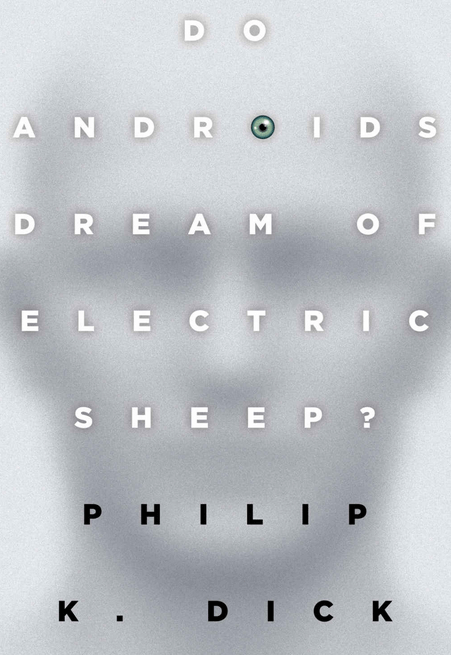
No one did deep, classic sci-fi books like Philip K. Dick. His stories were thought experiments in what it meant to be human, full of twists and turns like the folds and wrinkles of a human brain working as hard as it could. Understandably, Dick has been adapted for film many times into such properties as Total Recall, The Man in the High Castle, and Minority Report. It’s hard to pick one standout, but Do Androids Dream of Electric Sheep? (shortened for the film adaptation to the more marketable Blade Runner) deserves special mention as the Dickiest Dick novel of them all.
Set in a post-war, irradiated world of reduced fauna, off-world colonies, and android servants, the novel follows Rick Deckard, an ex-cop assigned to kill six androids from a dangerous humanoid line. Androids are identified by an empathy test, but in pursuit of his android quarry, Deckard begins to feel empathy for the androids and even question the nature of consciousness. It’s a deep, early exploration in the ethics of artificial intelligence and human/robot relationships.
Buy Do Androids Dream of Electric Sheep? by Philip K. Dick on Amazon here.
12- Ringworld by Larry Niven
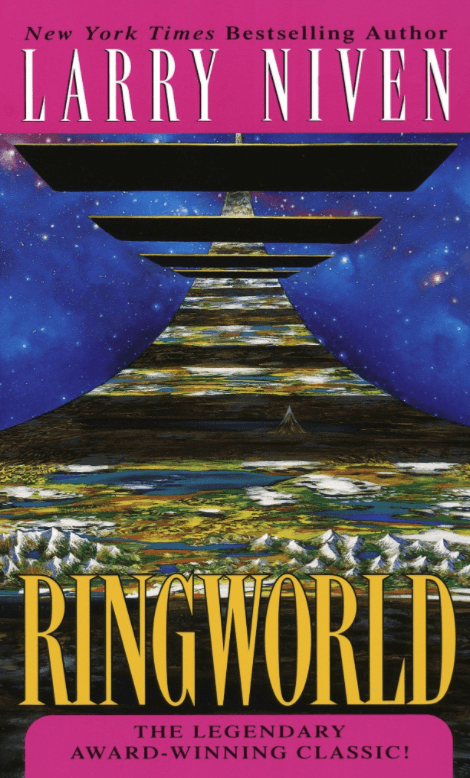
Before there was Halo, there was Ringworld. A part of Larry Niven’s “Known Space” series, Ringworld is similarly set in the far human future and populated by a melange of space faring humans and other extraterrestrials familiar from the other “Known Space” books. But Ringworld has the happy distinction of being an easy sell just for the setting. The idea is something like a Dyson Sphere, only it’s more of a “Dyson Ring”—a gigantic artificial ring encircling a star, as large as the orbit of the earth, with a habitable inner surface equal in area to 3 million earths.
To this space oddity ventures Louis Wu, bored with his long and healthy life extended by super medicines to over 200 years. He is joined by a love interest and an alien companion on a trip to investigate Ringworld and determine if it poses a threat. Reaching Ringworld is an epic trek in and of itself, but the world they discover—and become standard on—is more than they bargained for.
Buy Ringworld by Larry Niven on Amazon here.
13- Solaris by Stanislaw Lem

For decades, Solaris has been one of the classic sci-fi books for deep thinkers. In many ways, it’s the anti-Star Trek, the antithesis of a galaxy where every alien we meet walks on two legs, offers the crew tea, and understands English (give or take a universal translator). Solaris brings to mind the argument that we can’t even have a philosophical conversation with our own household pets–so in what universe do we expect to have philosophical conversations with extraterrestrials?
The Solaris of the title refers to an obtuse alien planet that a crew visits to try and discover the nature of a global, jelly-like ocean. The ocean turns out to be a single living organism, covering the whole planet. Curious scientists’ more and more aggressive attempts to communicate with the organism only provoke more and more aggressive reactions—Solaris causes the crew members’ lost loved ones to appear in the flesh, traumatic reminders of the crewmembers’ guilt. They plumb the depths of their own souls, but Solaris remains maddeningly blank, holding back its secrets from a species to whom it owes no explanation.
Buy Solaris by Stanislaw Lem on Amazon here.
14- Slaughterhouse-Five by Kurt Vonnegut
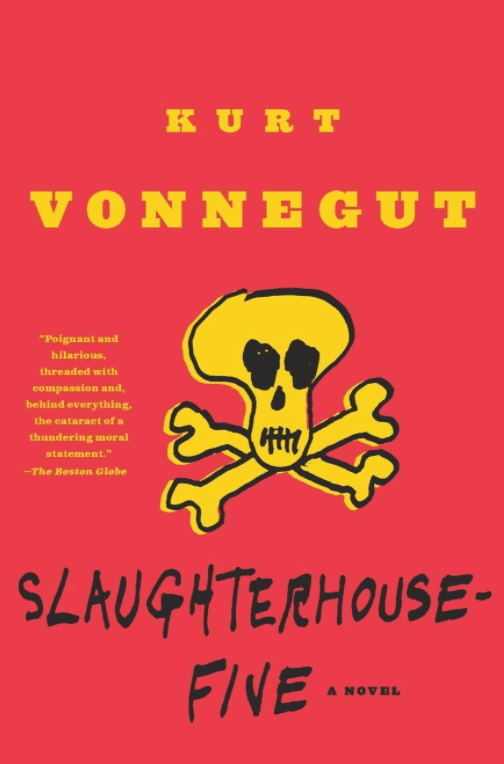
Vonnegut’s masterpiece takes us on a wild ride with Billy Pilgrim, a traumatized WWII chaplain’s assistant who refuses to fight. Captured by the Germans and near death, he becomes unstuck in time, revisiting moments of his past. After surviving the fire-bombing and total destruction of Dresden, Pilgrim is liberated but soon institutionalized for post-traumatic stress disorder. Many of these events are drawn from Vonnegut’s own experiences in World War II’s decimation of Europe.
From there, it gets even more interesting. Billy continues to experience his life out of sequence, reliving his past and jumping forward to his future, including the experience of being abducted by an alien race called the Tralfamadorians, who can see all points in time simultaneously and accept death the same way we accept the ticking of the seconds.
Into this zany, ironic, hilarious story, Vonnegut weaves themes of fate, free will, the futility of war, what we might do differently if we could see the future, and the possibility of a second start.
Buy Slaughterhouse-Five by Kurt Vonnegut on Amazon here.
15- Snow Crash by Neal Stephenson

Stephenson’s bonkers book Snow Crash introduces readers to what would become “anarcho-capitalism”—a system prevalent in his later books, where the economy collapses, governments can’t function, and territories like the United States are partitioned out to various corporate sponsorships rather than governments. The Mafia has corporate sponsorships, including a pizza franchise; suburban communities are semi-sovereign states. Welcome to Neal Stephenson’s near future. Does it really look that much different than what you expected?
Also, meet Stephenson’s main character, Hiro Protagonist. (But what’s in a name?) By day he delivers pizza for the Mafia. By night he disappears into the Metaverse, a kind of VR internet that resembles a massive MMORPG. When a stranger within the metaverse offers Hiro a file called “Snow Crash,” he thinks it is some kind of advanced cyber drug. But the next thing he knows, “Snow Crash” causes his friend brain damage, and Hero is caught up in a neuro-linguistic intrigue that may have its origins in the mythic Tower of Babel.
Buy Snow Crash by Neal Stephenson on Amazon here.
16- Hyperion by Dan Simmons

You can’t beat Hyperion, the first book in Simmons’ “Hyperion Cantos,” for immersive world-building. Like many good sci-fi books, the far-future setting gets more fascinating with every page, following multiple characters through multiple timelines in a sci-fi/fantasy reimagining of Chaucer’s Canterbury Tales.
The Hyperion of the title is a far-flung world with no “farcasters” to connect it to a galactic empire known as the Hegemony of Man, which exists in fragile balance with the AI civilization TechnoCore. Hyperion is notable for its “Time Tombs,” structures that seem to be moving backwards in time and which are guarded by a mysterious monster known as the “Shrike.”
Visitors to Hyperion, with its strange ecosystem and laws of physics, include a Catholic priest, a Jewish pilgrim, an AWOL military officer, a refugee poet, a private investigator, and other weird and wonderful personalities who bring Hyperion to life.
Buy Hyperion by Dan Simmons on Amazon here.
17- Prelude to Foundation by Isaac Asimov
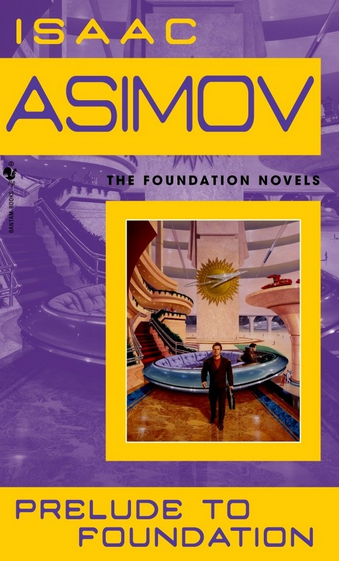
Prolific biochemistry professor-turned-hard sci-fi author Isaac Asimov could occupy every spot on this list if we let him. His sprawling output includes many standalone gems of the genre, but he is best-known for the sprawling, interconnected Robot, Empire, and Foundation series, which form a grand arc of the rise and fall of a galactic empire, with an immortal robot watchdog named Daneel Olivaw popping in every few thousand years or so to remind us how far we have come.
Asimov’s orthodox masterpiece is the original Foundation novel, which posits a utopia based on the practice of psychohistory, a means of using past events to accurately predict the future. However, we are going to go with the prequel novel Prelude to Foundation, which checks in on a young Hari Seldon shortly after he discovers psychohistory. He immediately becomes a target for Imperial forces due to his dangerous discovery. The result is a game of cat-and-mouse across the unforgettable Galactic mega-capitol planet Trantor. Seldon meets many memorable characters on his journey toward Foundation, including a blast from the deep past that ties all three of Asimov’s signature series together in a satisfying bow.
Buy Prelude to Foundation by Isaac Asimov on Amazon here.
18- Ender’s Game by Orson Scott Card
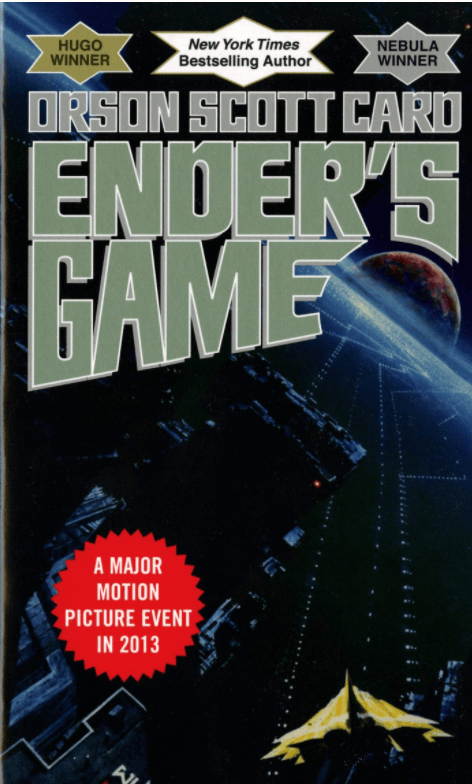
Ender’s Game has been popular since its release, and justly so. In some ways it presages the popularity of Harry Potter, starring a misfit kid with a destiny he doesn’t fully understand, who becomes a pawn in a battle beyond his ability to reckon with, before ultimately retaking his own life. It’s a classic hero’s journey, told in the breathless and rip-roaring prose of military hoo-ah that dissolves into a crisis of confidence.
The tribulations that face young Ender resonate today. Born the illicit third child in a two-child society, he endures ridicule and divestiture in a bid to gain acceptance to an elite military academy in a time when a spacefaring humankind has locked itself into a permanent war with hostile aliens known as the “Buggers” (it’s an intriguing companion piece for Robert Heinlein’s Starship Troopers, which barely missed this list, in which humans similarly war with interstellar bugs.)
The moral hazards of the real world hit Ender like a ton of bricks. Not only do the Buggers turn out to be more than what the propaganda has made them out to be, but Ender comes to find out that the “games,” or battle simulations that have formed the meat of his training, have come at a gut-wrenching cost, sending him on a defiant odyssey to right a terrible wrong perpetrated in his name.
Buy Ender’s Game by Orson Scott Card on Amazon here.
19- The Hitchhiker’s Guide to the Galaxy by Douglas Adams
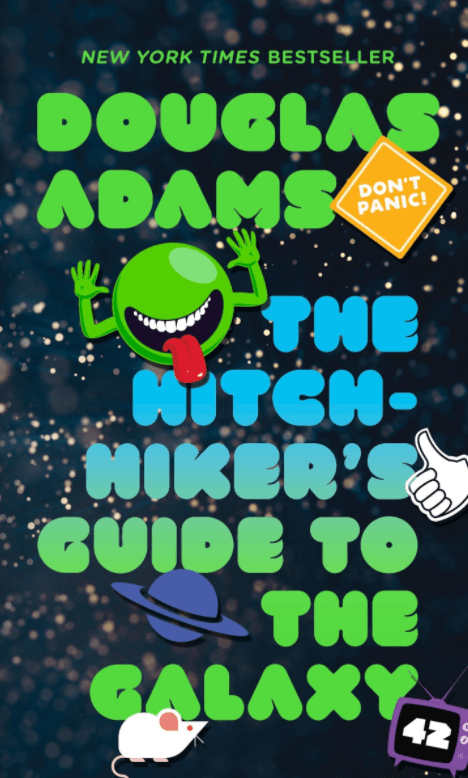
Do good sci-fi books always have to be so serious? No one will mistake Douglas Adams’ signature comedy novel for hard sci-fi, but who cares? It’s so much fun, sending up the very genre of sci fi with beat after beat of hilarious prose. The entire action kicks off with the world scheduled for demolition by interstellar highway developers (if we wanted to protest, notice was posted at Alpha Centauri—we should have made our complaint in a timely fashion). The dolphins (smarter than humans) knew it was coming and spirited away from earth at the last minute with a final message to humankind—”So long, and thanks for all the fish.”
From the wreckage of earth, The Hitchhiker’s Guide to the Galaxy whisks everyman hero Arthur Dent on a tour of a galaxy populated by hilarious characters like Ford Prefect, a researcher for the eponymous guide who hasn’t quite gotten the hang of human names; Zaphod Beeblebrox, the two-headed President of the Galaxy who goes AWOL; and Marvin, a depressed android. They travel the cosmos thanks to the Infinite Improbability Drive, which creates improbable side effects like a million lightly-fried eggs materializing on a planet where the entire population died of starvation a week ago–except for one survivor, who dies of cholesterol poisoning a week later.
Buy The Hitchhiker’s Guide to the Galaxy on Amazon here.
20- Dune by Frank Herbert

The Dune series has taken on a life of its own. 18 books span 34,000 years of feudal struggle in a far-future society that hinges on the fulcrum of an inexhaustible demand for a spice that powers ships and grants superpowers. The spice can only be mined on the most valuable and hotly contested piece of real estate in the galaxy—the desert planet Arrakis, aka Dune, home of gigantic psychic sandworms and a family with a mythic destiny.
For how bloated the series has become (and how impossible it seems to be to adapt it into a watchable film), the original Dune has lost none of its hypnotic, immersive power as it guides us through the struggles between House Atreides and House Harkonnen, the Fremen native to Dune and the human interlopers, brutish Baron Harkonnen and messianic Paul Atreides who vie for control of the spice—and thereby control of the galaxy.
Buy Dune by Frank Herbert on Amazon here.
21- 2001: A Space Odyssey by Arthur C. Clarke

Clarke is considered one of the “big three” postwar sci-fi authors, alongside Heinlein and Asimov. In addition to writing numerous great and good sci-fi books, he also has the distinction of having a satellite orbital strategy named after him—the “Clarke Orbit,” a geosynchronous orbit he championed in popular science magazines.
People are often unclear if Stanley Kubrick’s classic film was based on a book by Clarke or if Clarke wrote the book after the film was released. (Clarke himself resented Kubrick for giving the impression that his book was a novelisation of the film.) The truth is that Clarke developed the screenplay and the novel in tandem. Interestingly, in the novel the destination is Saturn as opposed to Jupiter in the film, although Clarke diverted back to Jupiter for the sequels.
Suffice it to say, 2001: A Space Odyssey is a novel that more than holds up and stands alone. It digs deep into the mind of “Moon-Watcher,” the early hominid star of the wordless first act of the Kubrick film. The novel then follows characters like Heywood Flood, David Bowman, and the infamous computer HAL-9000, on a trek across the solar system in search of a beacon that may be from an alien intelligence or possibly a new level of human intelligence.
Buy 2001: A Space Odyssey by Arthur C. Clarke on Amazon here.
22- Neuromancer by William Gibson
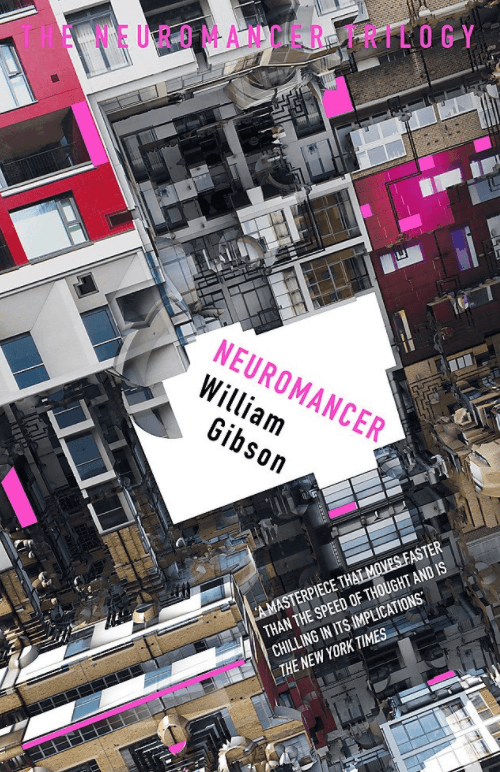
Gibson had written scattered short fiction when he was commissioned to write his debut novel and given a year. He panicked. He didn’t think he was ready. When Blade Runner came out, he abandoned a one-third finished novel because he was sure critics would assume that he had ripped off the Ridley Scott film to create his seedy near-future underworld. He had close to twelve false starts and despaired of ever being up to the task.
The novel he delivered, however, is one of the best sci-fi books of the generation, a centerpiece of a cyberpunk culture he helped create. It went on to win nearly every sci fi book award and influence billion-dollar properties like The Matrix. The term “World Wide Web,” which the “www” in every URL is shorthand for, was coined in Neuromancer before the tech world adopted it as a synonym for the nascent Internet.
Underlying the book’s mythology is the book itself, a taut tale of a disgraced hacker named Case, sentenced to being cognitively impaired by chemicals as a penalty for cybercrimes. Denizens of the Japanese underworld reverse Case’s impairment in exchange for his help hacking into a worldwide VR cyberscape, populated by powerful AIs on a quest to transcend their programming, the world itself.
Buy Neuromancer by William Gibson on Amazon here.
YOU MIGHT ALSO LIKE:
22 Best Artificial Intelligence Books to Read in 2020
16 Best Post-Apocalyptic Books of All Time
The Best Time Travel Books Ever Written
The Best Star Wars Books to Read Right Now
The Best Spiritual Books to Read in 2020


 Amazon.com
Amazon.com


















